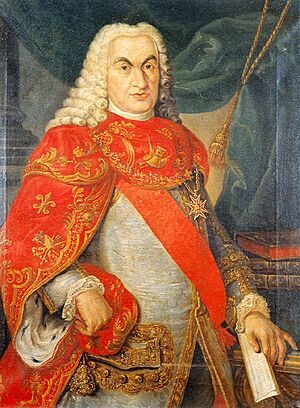Bernardo Tanucci facts for kids
Bernardo Tanucci (born February 20, 1698 – died April 29, 1783) was an important Italian politician. He helped lead the Kingdom of the Two Sicilies (which included parts of southern Italy and Sicily) in a modern way. He worked for King Charles III and later for Charles's son, King Ferdinand IV. Tanucci believed in a style of government called enlightened absolutism. This meant the king had strong power but used it to make society better and more modern.
Contents
Life and Early Career
Bernardo Tanucci was born into a poor family in a town called Stia, near Arezzo in Tuscany. He was lucky to have someone help him get an education at the University of Pisa. In 1725, Tanucci became a professor of law there. He became well-known for defending an old, important law book called the Codex Pisanus.
When Charles, Duke of Parma, who later became King Charles III of Spain, traveled through Tuscany to take over the Kingdom of Naples, the Grand Duke of Tuscany suggested he take Tanucci with him. Charles agreed and brought Tanucci to Naples.
Rising to Power
In Naples, Charles gave Tanucci several important jobs. First, he was a state advisor, then he managed the postal service. Later, he became the minister of justice in 1752 and foreign minister in 1754. Finally, he became the prime minister and was given the title of a marquis.
As prime minister, Tanucci worked hard to make the government stronger than the Catholic Church. He wanted to get rid of old feudal rules that gave special powers to the Church and the rich nobles in the Kingdom of the Two Sicilies.
Reforms and Modernization
Tanucci followed the ideas of enlightened absolutism. This meant he wanted the king to have strong control but use it to improve the country. He limited the power of bishops and removed old medieval privileges. He also closed many convents and monasteries. He reduced the taxes that had to be sent to the Pope's office in Rome.
Many of these changes were agreed upon in a special agreement with the Pope in 1741. However, Tanucci pushed these reforms even further than the Pope had intended.
Tanucci also started a group of smart lawyers to create a new set of laws for the kingdom. This new law code was called the Codice Caroline, but it was never actually put into use.
In 1759, Charles of Naples became King Charles III of Spain. He left his nine-year-old son, Ferdinand IV, in charge of Naples. Tanucci was made the head of the group that helped Ferdinand rule. Even when Ferdinand grew up, he often let Tanucci manage the government. King Charles III in Spain still kept a close eye on things.
Foreign Policy and Discoveries
In foreign affairs, Tanucci tried to keep Naples out of wars. For example, in 1742, an English fleet near the coast helped Naples stay neutral during a war between Spain and Austria.
Tanucci also advised King Charles VII of Naples when ancient scrolls were found in Herculaneum in 1752. The king then set up a group to study these important discoveries.
Controlling the Church
Tanucci worked to give the king more control over the Church, similar to how it was in France. For example, money from empty bishoprics (areas managed by a bishop) and abbeys (monasteries led by an abbot) went to the king. He also closed unnecessary convents and stopped the Church from gaining new property through a system called mortmain (where property could not be sold).
The king's approval was needed for any new rules from the Pope to be published in Naples. Tanucci also argued that Naples was not a fief (land held by a lord) of the Pope. He said the King of Naples answered only to God. People were also forbidden from appealing to Rome without the king's permission. Marriage was declared a civil contract, meaning it was a legal agreement, not just a religious one.
In 1767, King Charles III ordered the Jesuits (a powerful religious order) to be expelled from the Kingdom of Naples. Tanucci agreed with this decision, as did many other ministers in other European kingdoms at the time.
When Pope Clement XIII reacted by excommunicating (kicking out of the Church) Tanucci, Tanucci took control of some Church lands. These lands were not returned to the Pope until the Jesuits were dissolved in 1773. When bishops protested against new teachings in schools after the Jesuits left, their complaints were ignored.
Later Years and Dismissal
In 1774, Maria Carolina of Austria, who was King Ferdinand IV's wife, joined the Council of State. Her influence grew, and Tanucci's power began to fade. He tried to stop her influence, but it was too late. In 1777, he was dismissed from his position and retired.
Bernardo Tanucci died in Naples in 1783.
See also
 In Spanish: Bernardo Tanucci para niños
In Spanish: Bernardo Tanucci para niños
- Bernardo Tanucci (for more detailed information)
 | Toni Morrison |
 | Barack Obama |
 | Martin Luther King Jr. |
 | Ralph Bunche |


